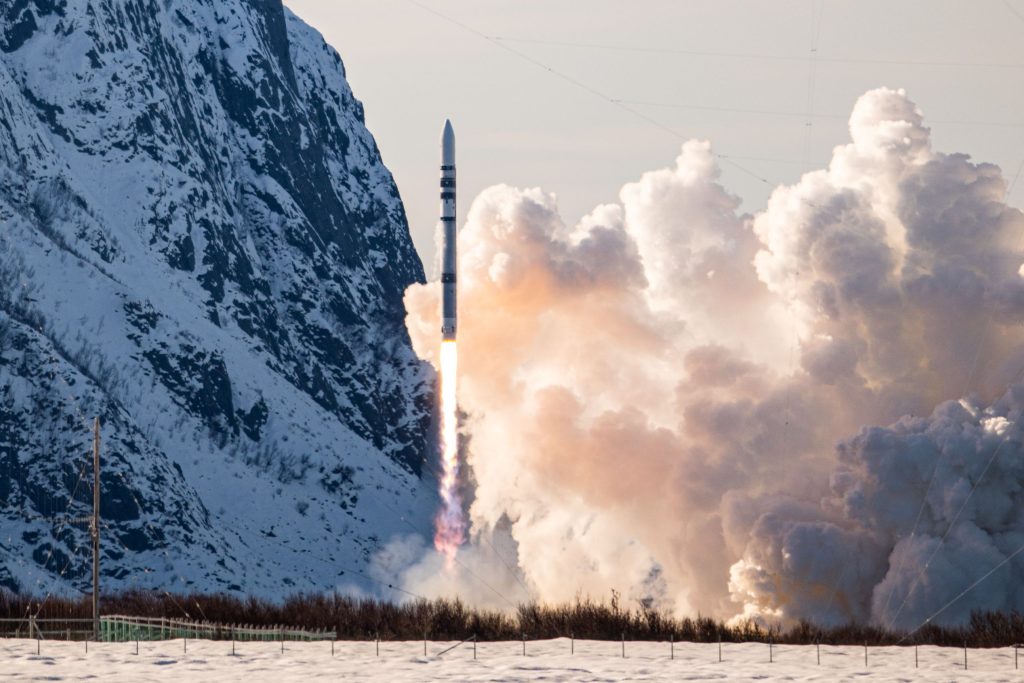The Rise of a New Continental Space Race

Europe is making significant strides toward establishing its own independent rocket launch capabilities, aiming to reduce reliance on external partners and bolster its position in the global space industry. A notable example of this ambition is the recent test flight by Isar Aerospace, a German startup that conducted the first-ever orbital rocket launch attempt from continental Europe.
On March 30, 2025, Isar Aerospace launched its Spectrum rocket from Norway’s Andøya Spaceport. The 28-meter, two-stage vehicle ignited its first stage and lifted off at 12:30 PM CEST. Approximately 30 seconds into the flight, the mission was intentionally terminated, and the rocket fell into the sea in a controlled manner. Despite not reaching orbit, the company deemed the test a success, having achieved key objectives such as a clean liftoff and validation of the Flight Termination System. CEO Daniel Metzler expressed confidence in approaching subsequent flights, emphasizing the importance of the data collected during this initial test. The launch was not only a technical milestone for the company but also a symbolic moment for Europe’s ambitions to take control of its own access to space.
Isar Aerospace’s test flight underscores a broader trend: Europe is actively fostering a competitive, homegrown space launch industry. Historically, Europe has depended on partnerships, particularly with Arianespace and international allies, for orbital launches. However, geopolitical shifts, the growing importance of satellite constellations, and increasing demand for launch services have led to a push for sovereign capabilities. Institutions like the European Space Agency (ESA) have created initiatives such as the “Boost!” program to promote innovation and private sector participation in the space launch market.
Among the startups spearheading this movement is Rocket Factory Augsburg (RFA), based in Germany. RFA is currently developing its RFA One rocket, designed to carry payloads of up to 1,300 kilograms into low Earth orbit. What sets RFA apart is its focus on a highly automated and modular production process, which it hopes will significantly lower launch costs. The company has secured a launch license from the UK’s Civil Aviation Authority to operate from SaxaVord Spaceport in the Shetland Islands, an important strategic location for polar and sun-synchronous launches. With its first launch expected in 2025, RFA is positioned as a major contender in the European microlauncher race.
In the United Kingdom, Orbex is also making waves. Headquartered in Forres, Scotland, Orbex is developing the Prime microlauncher, a lightweight rocket tailored for small satellite deployment. What distinguishes Orbex is its environmental focus, the rocket is designed to be reusable and uses renewable bio-propane as a fuel source, drastically reducing carbon emissions. The UK government recently announced a £20 million investment into Orbex, strengthening the country’s commitment to establishing a domestic launch sector and enabling the company to move toward its goal of launching from Sutherland Spaceport in the Scottish Highlands.
Spain’s PLD Space is another prominent player. Based in Elche, the company has successfully tested its Miura 1 suborbital rocket and is actively developing the Miura 5 orbital launcher. PLD Space is unique in its emphasis on reusability, aiming to recover and reuse its first-stage boosters, something only a few companies, such as SpaceX, have successfully done to date. By focusing on affordability and flexibility for satellite operators, PLD Space hopes to become the preferred launch provider for small payloads across Europe and Latin America.
In Scotland, Skyrora is developing a series of launch vehicles including the Skyrora XL, which aims to carry up to 315 kilograms to low Earth orbit. The company sets itself apart with its environmental consciousness, using a proprietary fuel called “Ecosene,” which is derived from waste plastics. Skyrora has conducted a range of suborbital tests and is planning to commence full orbital launches from UK soil. With its emphasis on sustainability and local manufacturing, Skyrora is capturing attention as a green alternative in the space sector.
HyImpulse, another German startup, is taking a different technological route by developing hybrid-propellant rockets. The company’s SR75 and SL1 launch vehicles use a combination of solid fuel and liquid oxidizers, which offers a safer and potentially more cost-effective alternative to traditional propulsion systems. HyImpulse is positioning itself as a flexible provider for suborbital and orbital missions and has conducted multiple engine tests to validate its hybrid propulsion technology. With interest growing from commercial and governmental customers, HyImpulse aims to provide affordable, reliable access to space for small satellite operators.
Despite the momentum, Europe’s emerging launch ecosystem still faces several challenges. Regulatory red tape, fragmented national space policies, and a lack of shared infrastructure have slowed progress compared to counterparts in the United States and China. However, the collective ambition is clear: to establish a network of competitive launch providers capable of serving both domestic and global markets. The involvement of private companies, backed by government support and investment, is fostering innovation and reducing costs, making European launch services increasingly attractive.
Europe’s pursuit of autonomous rocket capabilities is more than a matter of industrial strategy, it’s a question of technological sovereignty and economic competitiveness in the 21st century. Companies like Isar Aerospace, RFA, Orbex, PLD Space, Skyrora, and HyImpulse are not only proving the technical feasibility of continental launch vehicles but are also laying the foundation for a vibrant and resilient space economy.
The recent test flights, government investments, and infrastructure development across multiple countries indicate a clear trajectory: Europe is preparing to become a key player in global space access. With continued innovation and strategic support, the continent could soon offer a diverse and competitive array of launch options—right from its own soil.





